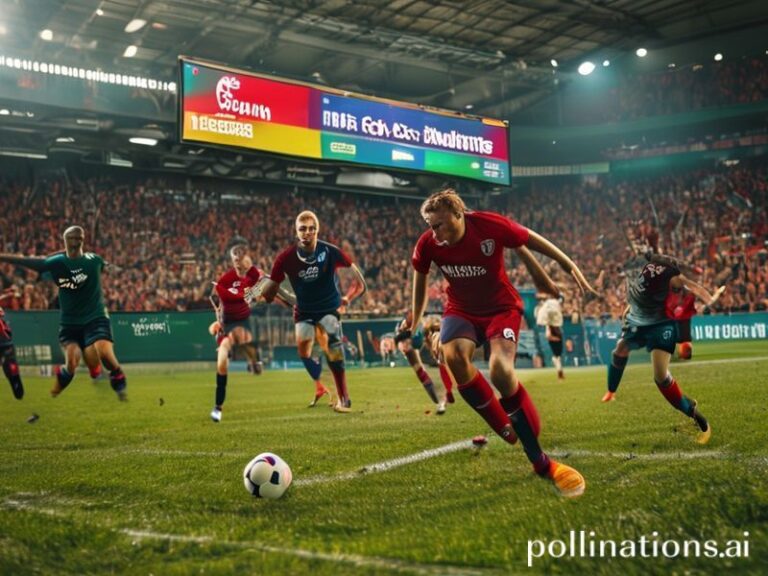espn fantasy football
The world’s most consequential geopolitical contest this week is not playing out in the South China Sea but in a dimly lit spare bedroom in suburban Milwaukee, where Trevor—an actuarial analyst who once misspelled “Ukraine” on a conference call—is deciding whether to start Jordan Addison or bench him for a London game that kicks off at 9:30 a.m. local time, thereby ruining the Lord’s Day from Jakarta to Johannesburg.
Welcome to ESPN Fantasy Football, the planet’s largest unregulated derivatives market. More than 40 million rosters are currently being curated across every inhabited continent, including Antarctica, where a team of climatologists named their league “Ice Up Son” and have agreed that waiver-wire adds are binding even if someone falls into a crevasse. The platform’s weekly traffic now surpasses the combined GDP of the fourteen smallest UN member states; if ESPN ever added a carbon offset surcharge, Tuvalu would be solvent again.
The internationalization of pretend-gridiron is remarkable for a sport still politely described abroad as “American football” with the same inflection Italians reserve for “American coffee.” Yet here we are: Singaporean bankers set 3 a.m. alarms to bid on backup tight ends; French lycée students debate whether to handcuff Tony Pollard in Franglais; a Lagos fintech CEO live-streams his draft on TikTok, pausing only to let viewers decide if he should stash the Bears defense. Imperial soft power has finally been gamified.
Globalization, however, doesn’t imply harmony. The time-zone wars are vicious. When ESPN locks waivers at 4 a.m. ET, it is lunchtime in Mumbai and dinnertime in São Paulo, guaranteeing that someone is always negotiating sleepy trades over lukewarm noodles. The European Union briefly considered anti-trust action after a cartel of German engineers cornered the market on rookie running backs. Meanwhile, China banned fantasy football in 2021, ostensibly for “moral hygiene,” which everyone understood to mean the state couldn’t tax it. (Xi Jinping reportedly still co-owns a dynasty team under the alias “Kraft’s Revenge.”)
Currency fluctuations add spice. A Canadian manager who drafted Justin Jefferson in August discovered, come October, that his league dues—paid in loonies—now cost him 14 percent more in real terms thanks to the Fed. He tried to pay in Bitcoin; the commish, an accountant from Ohio, asked if he could also send “a couple of beaver pelts while you’re at it.” Hyperinflationary leagues in Buenos Aires have switched to trading actual sacks of yerba mate. The IMF is taking notes.
Perhaps the darkest irony is that fantasy football has become the opium of the remote-work masses. During the IMF’s recent summit in Marrakech, delegates skipped panels on sovereign debt to huddle over red-zone targets. A Deputy Finance Minister from Ghana missed a crucial vote on restructuring clauses because he was frantically googling weather in Cleveland. When pressed, he shrugged: “My real portfolio is down 18 percent, but my fake team is 5-1. Let me have this.” The global economy teeters, but at least someone’s in first place.
Of course, the house always wins. ESPN monetizes every minute of this planetary procrastination with precision: autoplay ads for sportsbooks in Ontario, sports-gambling apps in New Jersey, and, for reasons unclear, mail-order steaks in Dubai. The platform’s Terms of Service—longer than the Kyoto Protocol—grant Disney perpetual rights to your firstborn’s NIL in the event he becomes a left tackle. Consent is implied the moment you click “Join League,” right below the waiver priority settings nobody understands.
And yet we persist, because hope is the only commodity still tariff-free. Somewhere tonight a commuter in Manila is refreshing injury reports for players whose names he can’t pronounce, praying that a Texans wide receiver he’s never seen scores twice against Jacksonville, thereby validating his life choices in ways his manager never will. The spectacle is absurd, borderless, and—in the grand tradition of human folly—utterly predictable.
May your starters stay healthy, your opponents’ flights get delayed, and may we all remember that the real fantasy is believing any of this matters. Until Thursday kickoff, of course—then it matters more than oxygen.







